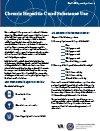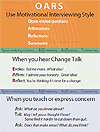Tools for Reducing Alcohol Use - Alcoholic Liver Disease
These resources are intended to help health care providers take a clinical approach to reducing alcohol use among patients with liver disease. Abstaining from alcohol is one of the most important factors in preserving liver health in individuals with liver disease. A non-confrontational, patient-centered approach in addressing alcohol use increases the likelihood that the patient will discuss the relevant incentives and barriers associated with behavior change.
Related Resources
Audit-C and Audit-C Scoring Cards

The 3-item version of the Alcohol Use Disorders Identification Test (AUDIT) can help quickly identify persons with hazardous and harmful patterns of alcohol consumption. Scoring cards for Veterans also are included.
Drinking Diary Card and Change Plan Template

Patients can record their alcohol use over a 4-week period on this wallet card as a way to monitor their drinking behavior. The opposite side of the card lists 5 important questions for patients who are ready to make a "change plan" to reduce the amount they drink.
Hepatitis C and Alcohol Patient Fact Sheet and Questionnaire

A patient handout detailing the dangers of alcohol use for individuals with hepatitis C and illustrating the risks for developing cirrhosis.
OARS/FLO Card

The purpose of this card is to help providers discuss alcohol use with Veterans with hepatitis C. The double-sided card contains tips and reminders: the OARS side discusses motivational interviewing; the FLO side discusses brief interventions.
Videos and Interactive Resources
Brief Counseling for Alcohol Misuse
A 3-minute video on brief alcohol intervention, a project of the Boston Medical Center, and a product of the Alcohol Clinical Training (ACT) Project. Supported by a grant from the National Institute on Alcohol Abuse and Alcoholism (NIAAA) and produced in cooperation with the Boston University Schools of Medicine and Public Health.




















